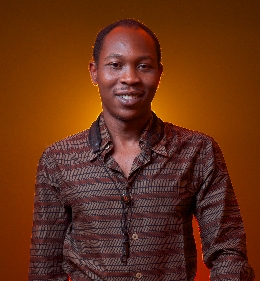Seun Kuti has inherited much from his father, the Afrobeat pioneer Fela Kuti: musical talent, charisma, a commanding stage presence, a burning desire for a better life for his Nigerian countrymen, and even his band Egypt 80. Along with the music of his brother Femi, which Seun heartily recommends, Seun (pronounced Shay-oon) is keeping Afrobeat – a rhythm-heavy, hypnotic mix of James Brown-style funk, jazz, Cuban and traditional West African music, featuring call-and-response vocals which are often about political topics – relevant in the 21st century. Seun’s second album, From Africa With Fury: Rise, was released last year, and he is currently touring the U.S., including an appearance at Coachella.
This interview, which was the basis of a preview article for his concert at UC Santa Barbara, was done by phone on 4/2/12. (photo credit: Kelechi Amadiobi)
Jeff Moehlis: What can we look forward to at your upcoming show at the University of California, Santa Barbara?
Seun Kuti: My last show is my best show, you know? When we play Santa Barbara, it’ll be our best show, that night.
JM: Could you tell us a bit about the band Egypt 80 that will be joining you?
SK: We have been playing together for sixteen years. It’s going to be a great event as usual. My friends and I, we are like a well-oiled machine. The music is an extension of ourselves.
JM: What is your relationship with your father’s previous band, Africa 70 band, say with [drummer] Tony Allen and [guitarist] Ogene Kologbo?
SK: Oh, I see them around a lot. Uncle Tony and I are quite close. When I’m in Paris I go to his house, he cooks for me. He’s a great guy. Kologbo is always with him as well. Kologbo is one crazy motherfucker. Pardon my French [laughs].
JM: You’ll be playing in Santa Barbara right after playing the first weekend at Coachella. What do you find special about playing at big festivals like Coachella?
SK: It’s all the energy you get from 60,000 people. It’s amazing when you play those big audiences – 50,000, 100,000 [people]. It’s really incredible. It’s able to match the intimacy of the club, when you’re playing the club, like 1,000, 2,000 [people], and they’re close to you. That intimacy is hard to defeat. But once you play with 50,000 people, the raw energy compares to that to me.

JM: Your latest album was produced, at least in part, by Brian Eno. What was it like working with him?
SK: It was really good working with Brian Eno. He taught me a lot of things, opened my eyes to a lot of things in music as well.
JM: How did you get him to produce it?
SK: Brian had been a big supporter of my music for two years before the album. He’d been a great friend and mentor. So when I wanted to do the new album I asked him, “Hey Brian, I’d love for you to produce my new album”, and he said “Yeah, when do we start?”
JM: What did you think of the musical Fela!?
SK: That was a great play.
JM: Do you think it accurately captured the spirit of your father?

SK: Yeah, it was the best that they can do with a Broadway play. I think the play gave… it brought the message to a new audience, which is important as well. I’ve seen the play twenty times, on three different continents, so I love the show. I love the music, and the band, too.
JM: What are some of your memories of the Kalakuta Republic?
SK: You grew up learning every day. You’d see new people. It was the ultimate social experiment, where everybody was equal. So it was a great time for me, my childhood.
JM: I know that you’re on tour right now. What are your plans, musical or otherwise, for the near future?
SK: I’m working on my next album. It never stops.
JM: When do you expect your next album to be ready?
SK: I can’t put a date on it. End of the year, beginning of next year.
JM: What advice would you give to an aspiring musician?
SK: Your music has to be a part of the solution. Your music has to stand for the majority of the people. Music should be used for the people. If in your country everyone is living the good life, like you’re in Switzerland, you can sing about champagne, and fast cars, and wristwatches, and all that. But if you feel that your people need change, and your people need to develop in some area, then dedicate your music to the people, because that is what music is for, truly. Music is not selfish, you know? In one word, I’ll tell the musician, music is not selfish. That is what I would say to an aspiring musician.


You as cool as your father keep it up we love you.